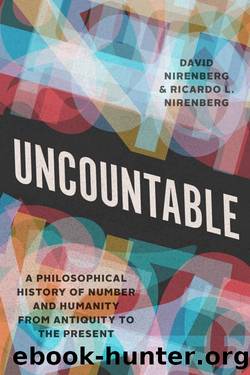Uncountable by David Nirenberg & Ricardo L. Nirenberg

Author:David Nirenberg & Ricardo L. Nirenberg [Nirenberg, David & Nirenberg, Ricardo L.]
Language: eng
Format: epub
Tags: HIS000000 History / General, PHI005000 Philosophy / Ethics & Moral Philosophy, MAT015000 Mathematics / History & Philosophy
ISBN: 9780226646985
Publisher: University of Chicago Press
Published: 2021-10-19T18:30:00+00:00
It is sometimes said that the laws of economics are ââhypothetical.ââ . . . Almost every scientific doctrine, when carefully and formally stated, will be found to contain some proviso to the effect that other things are equal; the action of the causes in question is supposed to be isolated; certain effects are attributed to them, but only on the hypothesis that no cause is permitted to enter except those distinctly allowed for.58
We might want to sayâwith Marshall and against Ruskinâthat economics is âlike every other scienceâ in that it uses provisional claims of âsamenessâ in order to produce laws that make increasing (perhaps even eventually predictive) sense of the empirical world. âIn committing oneself to a law qualified with a ceteris paribus clause, one envisions that the imprecision of the predicate [C] one is picking out will diminish without limit as oneâs scientific knowledge increases.â59 But what is striking about economics and the social sciences in comparison to âevery other scienceâ (such as physics) is just how little the âimprecisionâ of ceteris paribus clauses (such as âeverybodyâs preferences are transitiveâ) has in fact diminished, and conversely, how little their predictive power has advanced.60
This is not for lack of trying. Enormous mathematical effort has been invested in increasing the purchase of formal economic models on the empirical world. The Cowles Commission at the University of Chicago in the 1950s, for example, was tremendously productive in posing the theoretical problems at stake, but by the 1960s the limited empirical reach of their formal models was already recognized. The ensuing search for âpolicy invariantâ structural parameters (i.e., a sameness that stays the same), championed by Leonid Hurwicz with the sharpest of mathematical weapons, foundered on the fact that âeconomic data, both micro and macro, have not yielded many stable structural parameters.â61
Yet another increasingly popular approach has taken randomization as a benchmark and tries to identify causal parameters by looking for ânatural experimentsâ within societies (such as a sudden change in law or regulation), specific social experiments (such as the introduction of a childcare program with randomized eligibility), or even laboratory experiments (such as participant behavior in role-playing games).62 And today, as more and more human behavior from daily life âin the wildâ is translated into computational data by smartphone, search engines, wearable devices, and other technologies, formal models and their âsamenessâ clauses can be tested against (or derived from) databases of exponentially increasing size and quality, driving theory and the empirical into an ever-more-intimate embrace.
Each step in this history has been accompanied by the hope that it might further refine the âsameness clausesâ assumed by the theory. For example, in âWhat Do Laboratory Experiments Measuring Social Preferences Reveal about the Real World?.â Steven Levitt and John List write that âthe allure of the laboratory experimental method in economics is that, in principle, it provides ceteris paribus observations of individual economic agents, which are otherwise difficult to obtain.â But as they then go on to note, the preferences revealed in a lab are
Download
This site does not store any files on its server. We only index and link to content provided by other sites. Please contact the content providers to delete copyright contents if any and email us, we'll remove relevant links or contents immediately.
| Africa | Americas |
| Arctic & Antarctica | Asia |
| Australia & Oceania | Europe |
| Middle East | Russia |
| United States | World |
| Ancient Civilizations | Military |
| Historical Study & Educational Resources |
Magic and Divination in Early Islam by Emilie Savage-Smith;(1206)
Ambition and Desire: The Dangerous Life of Josephine Bonaparte by Kate Williams(1099)
Operation Vengeance: The Astonishing Aerial Ambush That Changed World War II by Dan Hampton(990)
What Really Happened: The Death of Hitler by Robert J. Hutchinson(887)
London in the Twentieth Century by Jerry White(860)
Time of the Magicians by Wolfram Eilenberger(852)
Twilight of the Gods by Ian W. Toll(825)
The Japanese by Christopher Harding(814)
Papillon by Henry Charrière(810)
Lenin: A Biography by Robert Service(790)
The Devil You Know by Charles M. Blow(788)
Twelve Caesars by Mary Beard(781)
Freemasons for Dummies by Hodapp Christopher;(755)
The Churchill Complex by Ian Buruma(736)
Bohemians, Bootleggers, Flappers, and Swells: The Best of Early Vanity Fair by Bohemians Bootleggers Flappers & Swells- The Best of Early Vanity Fair (epub)(719)
Napolean Hill Collection by Napoleon Hill(709)
Henry III by David Carpenter;(700)
The Enlightenment by Ritchie Robertson(699)
The Rise and Triumph of the Modern Self by Unknown(692)
